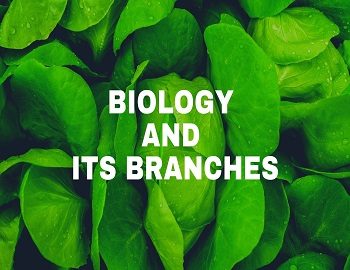Table of Contents
What is Biology?
Biology is defined as the branch of science that deals with the study of living organisms. It has been divided into two main subdivisions- Zoology (the study of living animals) and Botany (the study of living plants).
Various Branches of Biology:
- Parasitology- is the branch of biology that deals with the study of parasites (disease-causing organisms).
- Taxonomy- is the branch of biology that deals with identifying, naming (nomenclature) and classifying organisms into various groups.
- Morphology- is the study of form and external structure.
- Anatomy- is the study of internal structure.
- Histology- is the study of cells and tissues with the help of a microscope.
- Cell Biology- deals with the structure, function, reproduction and all other activities of a cell itself.
- Molecular Biology- is the study of the Physico-chemical organisation of biomolecules such as nucleic acids, the composition of organic compounds and mechanisms of their synthesis.
- Physiology- is the study of various processes and functions of life.
- Embryology- is the study of various events and changes that occur in the formation of a zygote, the development of an embryo and its transformation into a complete individual.
- Ecology- is the branch of biology which deals with the relation between organisms and their environment.
- Genetics- is the study of the inheritance of characters from parents to offsprings.
- Evolution- is the formation of new species from pre-existing ones as a result of a slow and continuous process.
- Palaeo-biology- deals with the study of origin, structure and growth of various forms of life that have existed in the past and only their fossils are available now.
- Exo-biology- is a branch of biology which deals with the kind of life that may exist in outer space.
- Anthropology- is the study of mankind, especially of its society and customs, structure and evolution of man.
- Agronomy- is the science of soil management and crop production.
- Pathology- is the science dealing with the nature of diseases, their causes, symptoms and effects.
- Veterinary Medicine- deals with the diseases of animals and their health care.
- Entomology- is the study of insects.
- Sericulture- is the breeding and treatment of silkworms for producing raw silk.
- Apiculture- is the rearing of bees for commercial purpose.
- Micro-biology- is the science dealing with the structure, function and uses of microscopic organisms.
- Poultry science- deals with domestic fowls, chickens, ducks etc.
- Pharmacology- is the science dealing with drugs, their sources, chemistry, action and uses.
- Forensic Medicine- deals with the legal aspects of medicine.
- Limnology- is the study that deals with the freshwater lakes, ponds and streams in relation to plants and animals.
- Immunology- is the study of the resistance of organisms against infection.
- Biochemistry- is the study that deals with chemical reactions in relation to life activities.
- Ethology- is the study of the behaviour of animals.
Importance of the study of Life Science:
- The study of life science is important for human life as it helps man to understand his own body and mind.
- It helps to know various life activities going on in the body of living organisms and thus, establish their main characteristics for the benefit of the human race.
- It helps to understand and appreciate nature and natural laws.
- It helps to know the relationship of living beings with the environment.
- It helps to know about the type of diseases from which the living beings can suffer and thus, find out the remedial measures.
- It enables us to understand the economic importance of animals and plants related to medicine, industry, agriculture etc.
- It enables us to understand the ways and means of conserving natural resources.
- It helps us to solve various problems such as radiation hazards, shortage of food, overpopulation, diseases etc.
- It can serve as a foundation for such professions as medicine, dentistry, agriculture, nursing, fishery, forestry, bacteriology etc.
- For research work.
In general, life sciences can be of tremendous importance and use in human welfare.
- Male Reproductive System
- Female Reproductive System
- Acquired Immuno Deficiency Syndrome (AIDS)
- Parthenogenesis: Types And Significance
- Pollination: Types and Its Importance
- Chlorophyta- Green Algae
- Rhodophyta- Red Algae
- Phaeophyta- Brown Algae
- Bryophytes- Characteristics And Economic Importance
- Phylum Porifera- Characteristics
- Essential and Non-essential Parts of the Flowers
- Nutrition and Digestion-NIOS









Comments (No)